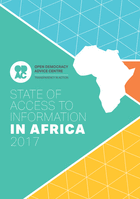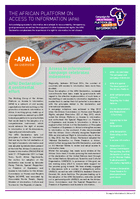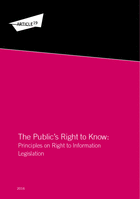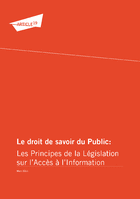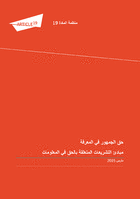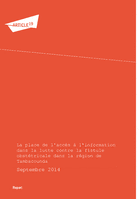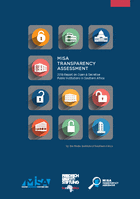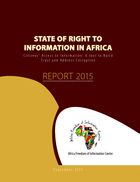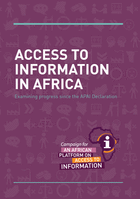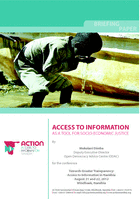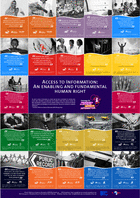Access to Information: An enabling and fundamental human right
Resources
State of Press Freedom in Southern Africa, 2019-2020
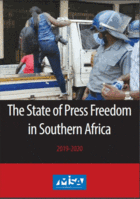
This document is based on country reports for Angola, Botswana, Eswatini, Lesotho, Malawi, Mozambique, Namibia,Tanzania, Zambia and Zimbabwe.
The African Union: A guide for Human Rights Defenders in the digital age, 2018
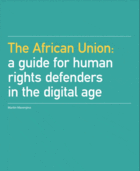
Rapidly growing internet penetration rates in Africa have an provided unprecedented platform for the realization of the right to freedom of expression and other human rights. This guide is designed for CSOs in Africa who want to use the AU system to advance human rights in the digital age.
State of Right to Information in Africa in the context of SDGs
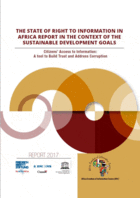
The 2030 Agenda for Sustainable Development charts a new vision for cooperation to ensure prosperity and well-being for all societies, while protecting the planet and strengthening peace.
This report explores the state of right to information in Africa in the context of SDGs.
State of Access to Information in Africa 2017
The APAI Declaration was adopted on 19 September 2011, upon a motion for adoption moved by Advocate Pansy Tlakula, Special Rapporteur on Freedom of Expression and Access to Information of the African Commission on Human and People’s Rights and seconded by Honourable Norris Tweah, Deputy Minister of Information, Culture and Tourism for the Republic of Liberia.
This research has demonstrated, however, that the document has had impact beyond its mere “declaration”. Members of the APAI Working Group were able to outline the variety of ways this ambitious Declaration has managed to impact domestic environments.
APAI Information Pack
Acknowledging access to information as a catalyst for accountability, transparency, good governance, as well as the enjoyment of other fundamental rights, the APAI Declaration emphasises the importance of a right to information for all citizens.
National ATI (Access to Information) Laws
National ATI (Access to Information) Laws
- Angola Law on Access to Administrative Documents 2002 (58 KB)
Zimbabwe Access to Information and Public Privacy Act 2002 (155 KB)
Uganda Access to Information Act 2005 (98 KB)
Ethiopia Freedom of the Mass Media and ATI Proclamation 2008 (242 KB)
Niger Chater on Access to Public and Administrative Documents 2011 (76 KB)
Nigeria Freedom of Information Bill 2011 (42 KB)
Tunisia Decree on Access to the Administrative Documents of Public Authorities of Tunisia 2011 (59 KB)
Guinea Organic Law on the Right of Access to Public Information 2012 (80 KB)
Liberia Freedom of Information Act 2012 (123 KB)
Ivory Coast Law on Access to Information of Public Interest 2013 (189 KB)
Rwanda Law Relating to Access to Information 2013 (1 MB)
Sierra Leone The Right to Access to Information Act 2013 (65 KB)
Standards and Principles
Guidelines on Access to Information and Elections in Africa
African Youth Charter
African Union Convention on Preventing and Combating Corruption
African Charter on Values and Principles of Public Service and Administration
African Charter on Statistics
African Charter on Democracy, Elections and Governance
African Charter on Human and People's Rights
Children's Declaration on Access to Information
The African Commission: Resolution 222
- 222: Resolution to modify the Declaration of Principles on Freedom of Expression to include Access to Information and Request for a Commemorative Day on Freedom of Information (194 KB)
222: R é solution sur la modification de la D é claration de Principes sur la Libert é d ’ expression pour inclure l ’ acc è s à l ’ information et la demande d ’ une Journ é e comm é morative de la Libert é d ’ Information (97 KB)
The Midrand Declaration
African Union: Model Law on Access to Information for Africa
African Declaration on Internet Rights and Freedoms
Publications
Together for Reliable Information: Civil Society Synthesis Report on Monitoring SDG 16.10, AFIC, 2021
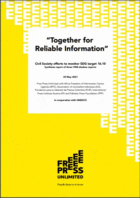
Regarding trends and issues related to press freedom and access to information in Africa, Africa Freedom of Information Centre carried out a comparative analysis of access to information legislation and the implementation thereof in Africa.
Viral Lies: Misinformation and the Coronavirus, Article 19, 2020
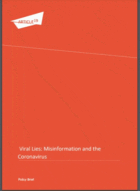
The media and social media companies must contribute to the fight against misinformation and hate speech related to the COVID-19 crisis.
Analysis of COVID-19 Regulations VIS-À-VIS Freedom of Expression in the SADC region, 2020
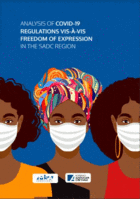
This study maps the current measures, and levels of restrictions on freedom of expression imposed by SADC Governments.
MISA Transparency Assessment 2020
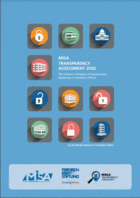
The Citizens' Assessment of Government Openness in Southern Africa.
Thinking Globally, Acting Locally: Reviving and sustaining South African Journalism in a post-COVID world, Highway Africa

The information vacuum left when communities lose dedicated news coverage can have wide-ranging effects. This report explores what South Africans can learn from other national media news systems in terms of thinking and experiments about novel ways for funding journalism, as South Africa anticipates emerging into a post-COVID world.
Leaving No One Behind: An Assessment of the Status of SDG 16.10.2 Implementation in Sierra Leone, South Africa and Tunisia, AFIC, 2019
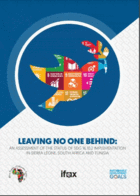
Access to information empowers citizens to better take part in their own governance and development.
IDUAI: 30 countries closed media and blocked internet access in 2019
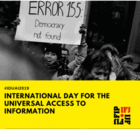
International Federation of Journalists has condemned the fact that over 30 countries have been guilty of closing media and blocking internet access so far in 2019, threatening citizens' fundamental right to free access to information.
West Africa Freedom of Expression Monitor, Media Foundation for West Africa 2019
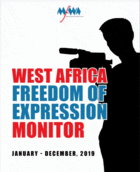
Press Freedom and Freedom of Expression have seen an improvement in West Africa over the past two decades. This report is a consolidation of the reports from MFWA's monitoring activities for the year 2019.
A Mixed Bag of Fortunes: Compilation of Rulings and Judgments in FOI Cases in Nigeria, 2012 – 2018
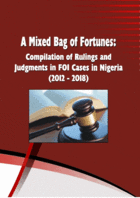
This compilation of rulings and judgements in Freedom of Information cases in Nigeria presents a mixed bag of fortunes for the FOI Act in the Judiciary.
The Public’s Right to Know: Principles on Right to Information Legislation, Article 19
These Principles were originally developed in 1999 and updated in 2015. They have been endorsed by the UN Special Rapporteur on Freedom of Opinion and Expression, in his report to the 2000 Session of the United Nations Commission on Human Rights (E/CN.4/2000/63), and referred to by the Commission in its 2000 Resolution on freedom of expression, as well as by his successor in 2013 in his report to the UN General Assembly in 2013 (A/68/362, 4 September 2013).
The Public’s Right to Know: Principles on Right to Information Legislation, Article 19 (French)
French Version
The Public’s Right to Know: Principles on Right to Information Legislation, Article 19 (Arabic)
Arabic Version
Access to Information in the fight against fistula, Article 19 (French)
La place de l'a ccès à l'information dans la lutte contre la fistule obstétricale dans la région de Tambacounda
Heroes Under Fire - South African Whistleblower Stories, ODAC
When we consider the actual experiences of citizens who blow the whistle in South Africa, it becomes clear that the ambitious constitutional principles that promote transparency are not enough to create a safe environment for those that speak out on wrongdoing. Whistleblowers in South Africa make decisions to blow the whistle based on their strong desire for justice, but because of these acts can become isolated and vulnerable.
Don't hit the switch: Making the case against Network Disruptions in Africa, 2017
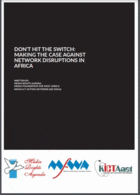
Network disruptions make up serious violations of a range of universal rights, including the right to freedom of opinion, expression, and access to information; and freedom of assembly and association. The aim of this policy brief is to support informed advocacy by CSOs against network disruptions in Africa.
MISA Transparency Assessment 2017
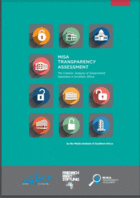
The Citizens's Analysis of Government Openness in Southern Africa
Right to Information Advocacy with the African Commission on Human and People's Rights, AFIC, 2016
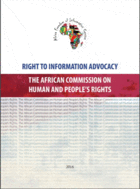
The right to information is a guiding principle for participatory democracies since only an informed population can effectively contribute to the construction of governments and political institutions.
MISA Transparency Assessment 2016
2016 Report on Open & Secretive Public Institutions in Southern Africa
State of Right to Information in Africa, AFIC Report 2015
Africa Freedom of Information Centre is a pan-African civil society organisation and resource centre that promotes the right of access to information on the continent through comparative research, coordinating regional advocacy, facilitating information-sharing and capacity building. AFIC is a membership organization with 33 civil society organisational members in 21 African countries that started operations in 2010.
Access to Information in Africa: Examining Progress since the APAI Declaration, 2013
Examining progress since the APAI Declaration
In order to further the ambitions of the APAI working group, in 2013 we undertook research – based upon the expertise and experience of our working group on access to information (ATI) issues in the region – which set out to provide a basic assessment on the state of access to information on the continent as a general reflection on the environment since the passage of the APAI Declaration on 19 September 2011.
Access to Information - As a Tool for Socio-Economic Justice, ACTION
It has been asserted that the 21 st century will be, or is, the African century. This assertion is supported to some extent by economic growth figures that show Africa is enjoying some of the highest levels of economic growth in the world.
State of Right to Information in Africa Report 2014, Africa Freedom of Information Centre
The State of Right to Information in Africa 2014 is the first issue of an annual reflection on the progresses on the fundamental human right.
Campaign Materials
APAI Human Rights Day Poster
The right to access to information is a human right and also a precondition for claiming otherhuman rights. Information is an asset that can be utilised to better lives, improve societies, and fight discrimination, corruption, as well as unlawful refusal of access to services and aid. Quite simply, information and knowledge are central to democracy. They are the conditions for sustainable development.
Read APAI Declaration here

African Platform on Access to Information
PDF, 220 KB

Plateforme africaine sur l’accès à l’information
PDF, 222 KB

المنهاج الأفرٌقً المعنً بالح صول ع لى ا لمعلومات

Plataforma Africana para Acesso à Informação
PDF, 211 KB


